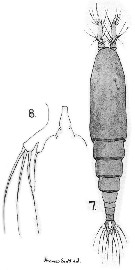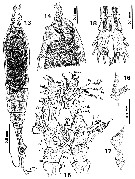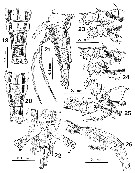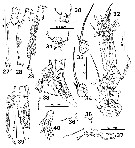|
|
 |
|
Monstrilloida ( Order ) |
|
|
|
Monstrillidae ( Family ) |
|
|
|
Monstrilla ( Genus ) |
|
|
| |
Monstrilla inserta A. Scott, 1909 (F) | |
| | | | | | | Ref.: | | | A. Scott, 1909 (p.237, Descr.F, figs.F); Wilson, 1942 a (p.195); Grygier, 1995 a (p.68); Suarez-Morales, 2001 (p.248, Redescr.F, figs.F); 2011 (p.9); 2011 (p.9) |  Issued from : A. Scott in The Copepoda of the Siboga Expedition Part I. Siboga-Expeditie XXIX a., 1909. [Pl. LVII, Figs.7-8]. Female (from off Pulu Kawassang, Paternoster Islands): 7, habitus (dorsal); 8, P5. Nota: Cephalic segment evenly rounded in the frontal portion and very slightly contracted at the distal end; it is slightly longer than the posterior part of the body. Frontal margin very narrowly rounded and slightly cleft. Abdomen 3-segmented. Genital segment sub-quadrangular in shape and traversed by a distinct suture rather in front of the middle; its length equal to twice the combined length of the next two segments; it is rather shorter than the united length of the next two segments and caudal rami. The 2nd and 3rd segments very short and nearly equal length. Caudal rami 3 times longer than the anal segment; each ramus with 1 outer marginal seta and 5 apical setae. A1 3-segmented, equal to one-third of the length of the cephalic segment. P5 rather slender and distinctly bi-lobed. The inner lobe narrower than the outer lobe and does not extend beyond the end of it; apex with 1 seta; the outer lobe with 3 setae. This species comes very near Monstrilla grandis in general appearance, and in the shape of P5. The chief difference is in the inner lobe of P5; Giesbrecht's figure shews the inner lobe of P5 M. grandis with 2 setae, instead 1 in the Siboga's specimens.
|
 Issued from : E. Suarez-Morales in Cah. Biol. Mar., 2001, 42. [p.249, Figs.13-18]. Female (from Curaçao): 13, habitus (dorsal); 14, head (lateral); 15, right and left A1 (dorsal); 16, oral papilla (detail); 17, frontal keel-like process (detail); 18, last urosomite and caudal rami (dorsal).
|
 Issued from : E. Suarez-Morales in Cah. Biol. Mar., 2001, 42. [p.250, Figs.19-26]. Female: 19, urosome (dorsal); 20, urosome (ventral); 21, same (lateral; setae omitted from P5); 22, P5 and bases of ovigerous spines (ventral); 23, P4 (posterior); 24, P2 (posterior); 25, P3 (anterior); 26, P5 showing complete setae. Nota: P5 biramous, noticeably elongated, separated at base. Exopodal lobe 4.8 times longer than wide, lobe armed with 3 long setae, these slightly plumose (Curaçao) or naked (type specimens), subequal in length and breadth, 1.3-2.1 times longer than bearing lobe. Endopodal lobe slender, partially fused with exopodal lobe, shorter than it, with only 1 terminal, relatively short seta, almost of same length as exopodal lobe.
|
 Issued from : E. Suarez-Morales in Cah. Biol. Mar., 2001, 42. [p.251, Figs.27-40]. Female (from Siboga RExpedition): 27, anterior ventral ornamentation of paralectotype; 28, same of lectotype; 29, same of peculiar paralectotype; 30, interantennular processes of lectotype (ventral); 31, same of peculiar paralectotype; 32, right A1 of lectotype (dorsal); 33, distal segment of exopod of P3, lectotype specimen; 34, same of P4; 35, outer basipodal seta of P1; 36, same of P3; 37, P5 of lectotype; 38, urosome of lectotype (lateral); 39, same of peculiar paralectotype; 40, right caudal ramus of lectotype (dorsal).
|
 Issued from : E. Suarez-Morales in Cah. Biol. Mar., 2001, 42. [p.248]. Female: Armature formula of swimming legs P1-P4.
| | | | | NZ: | 3 + 1 doubtful | | |
|
Distribution map of Monstrilla inserta by geographical zones
|
| | | | Loc: | | | Indonesia-Malaysia, Japan, ? off Hawaii (E & NE), Caribbean Sea (Curaçao) | | | | N: | 3 | | | | Lg.: | | | (5) F: 3,4 [with A1]; (2,6-2,9); (854) F: 1,97-2,04; {F: 1,97-2,90} | | | | Rem.: | After Suarez-Morales (2001, p.252) the Pacific record of this species by C.B. Wilson (1942) is doubtful. | | | Last update : 19/06/2023 | |
|
|
 Any use of this site for a publication will be mentioned with the following reference : Any use of this site for a publication will be mentioned with the following reference :
Razouls C., Desreumaux N., Kouwenberg J. and de Bovée F., 2005-2025. - Biodiversity of Marine Planktonic Copepods (morphology, geographical distribution and biological data). Sorbonne University, CNRS. Available at http://copepodes.obs-banyuls.fr/en [Accessed December 28, 2025] © copyright 2005-2025 Sorbonne University, CNRS
|
|
 |
 |







